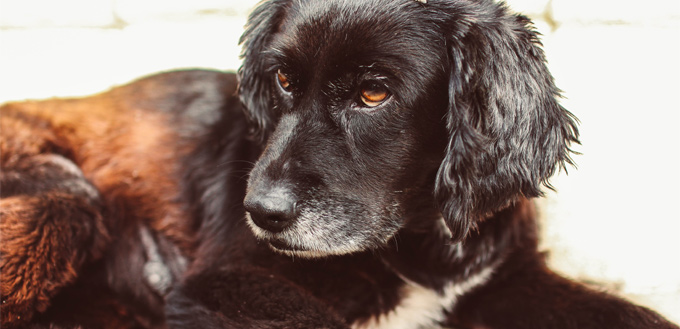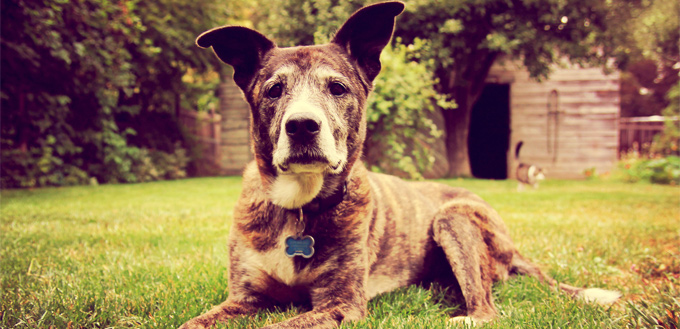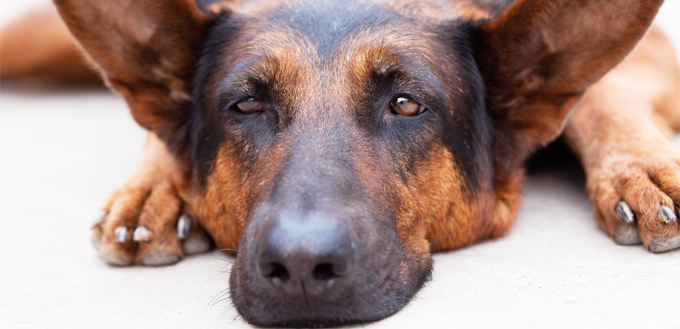It might not be something you want to think about, but inevitably, the spiritedly little puppy you took home all those years ago will gradually begin to slow down in age. As they get older, you will notice some differences in your dogs behaviour and health and will need to change their care accordingly. But don’t worry, this does not mean your dog has had their day; just because they are entering their later years, doesn’t mean they can’t have fun and still be a valued member of the family!
The age of which a dog is classified as a senior is, of course, dependant on the breed. For example, a chihuahua can expect to live up to 18 years, meaning they reach their winter years at about 10 years old. Large dogs such as great danes often live to just around 9 years old, which means that their senior begin at 5 to 6 years old. As a rule of thumb, smaller dogs tend to have a longer life expectancy. If your dog is beginning to shows signs of age, you will need to pay close attention to their health and well being and make the necessary changes to their lifestyle to ensure they are as happy and healthy as possible.

Painful Joints and Lack of Energy
There was a time when you would grab a dog leash, trill the all to familiar tune of ‘walkies!’ and your dog would come bounding up to you, eager to set out on your latest adventure together. However, the sprint to the front door has now come a half-hearted plod, they no longer have the energy to chase a tennis ball around the field and they find even getting down from the front step a difficulty. It’s important to ensure your dog has sufficient exercise at every stage of their lives, but as they get older, their energy levels decrease and their joints begin to struggle more than they used to. Rather than taking them for a long walk, it’s best to give to go for a short stroll around the block so as not to tire them out. This all depends on their capabilities, some senior dogs won’t be up for leaving the house at all, and may prefer an amble around their garden instead. Check out our guides on supplements for senior dogs and dog joint supplements for more info.
To help your dog get around the home with ease, it may be a good idea to purchase a sturdy dog ramp. This will aid them in ascending steep stairs, getting in and out of the house and even climbing onto the sofa for snuggle time! If your dog has pain in their joints or early signs of arthritis, an orthopaedic dog bed could be just the thing your dog needs to keep them comfortable and pain free at night. These cosy beds are often crafted from memory foam and offer dogs support as they sleep, reducing aches and pains, promoting healing and lessens the chance of bed sores. They also help to keep your dog warm by circulating the heat evenly. Head over to our review of heated dog beds.
Vision and Eye Health Problems
If you notice your dog has been bumping into things, falling over or their eyes look sore and cloudy, these could all be signs of deteriorating vision. Just like humans, dogs can succumb to health issues effecting their sight and general eye health. Most issues are treatable, such as dry eye syndrome, conjunctivitis and cataracts. Cataracts in particular are a common problem in older dogs and are categorised by a milky film over their eyes, causing them to look blue in colour. A routine operation will cure this ailment and keep your pooch’s eyes healthier and clearer for longer.
Dwindling eye sight is a normal part of the ageing process for dogs, however there are things you can do to make their life easier. Ask your vet for advice and take you dog to see them, most professional recommend taking senior dogs to the vets a minimum of two times a year.
Difficulties with Urination
You might have noticed that your dog is having problems with urinating. This issue could manifest itself in many different ways, such as straining to urinate, urinating more frequently and incontinence. Luckily, problems like these can often be solved by a trip to the vets and a change in diet. If you haven’t swapped your regular dog food for the senior variety, do this now! Senior dog food has a lower amount of calories and a balance of nutrients such as antioxidants and essential fatty acids which are necessary for your dog’s joint health and weakened immune system.
However, diet cannot fix everything. In serious cases, urinary issues can also be symptoms of kidney disease or a urinary tract infection. As always, take your doggy to the vets if you suspect there may be a problem.

Bad Breath and Sore Gums
Stinky breath is often a tell-tale sign of underlying dental issues. If your dog’s kisses are not smelling so fresh, they’ve probably got a problem with their teeth or gums. It’s never too late to start practising good dental hygiene on your dog, although it if you’ve never brushed their teeth before, it might be a bit of a struggle! Take a trip to your local pet store to purchase a special dog toothbrush and toothpaste. Dental chews are also a good shout, and much easier than trying to get a toothbrush in their mouth successfully.
If things have escalated to the point that your dog is drooling excessively, has bleeding gums and loose teeth, it’s likely they have some kind of oral disease. The vet will be able to advise you on the best course of action and preventative steps you can take to ensure things do not get any worse.
You may also like our article on the Best Dental Chews for Dogs.
Skin Issues
In their older years, your dog might have developed a number of skin and coat issues. These often present themselves as lumps, rashes and sometimes even fur loss. Whilst all of these problems can occur in dogs of any age, senior dogs are much more susceptible to them.
Although they are quite unsightly, most of the issues are benign and won’t cause your dog too much discomfort. However, it is always a good idea to speak to your vet to get any suspicious lumps and lesions checked out.
In order to keep your doggy’s coat and skin shiny and healthy, make sure you pick up a senior dog food that caters to all their needs. There are a great many varieties of senior dog foods on the market, so you’re sure to find something your pooch loves!
Weight Gain or Loss
Many dogs experience issues with their weight as they get older. This could be excessive weight gain or increased weight loss, depending on your dogs breed, diet and lifestyle. As with many of the problems dogs come across with age, these can be solved by selecting a nutrient rich senior dog food. Most senior dog foods have a lower calorific value than the regular variety, so should help if your dog is looking pudgier then normal. A little gentle exercise will also do them the world of good.
Weight loss in older dogs is rather common and nothing to be too concerned about. However, if the weight loss is considerable, its best to consult your vet to ensure there are no underlying issues such as illness or worms. They will be able to advise the best diet to get them back on track.

Memory Loss and Behavioural Issues
Does your dog sometimes fail to recognise you or a member of your family? Has their personality shifted a little, and they are acting more agitated than usual? Sadly, this could mean they are suffering from dementia. Also known as Cognitive Dysfunction Syndrome, dementia in dogs, just like in humans, is unfortunately a fairly common part of ageing. They may not even be able to remember some of the commands they have been taught, so be patient with them. As the saying goes, you can’t teach an old dog new tricks, so a change to their routine or way of life will not be welcomed.
In their early senior years, be sure to give your dog plenty of stimulating, puzzle toys that will encourage them to use their brains. Keeping their minds active will help to keep dementia at bay and of course, entertain them!
Although your beloved dog may have started to slow down in their golden years, they can still be a wonderful companion and you can still have lots of fun together. Don’t take it personally if they are not as responsive as they once were, they still love you and want to play, just maybe not as rambunctiously as much as before! If you have small children in your household, be sure to let them know they must be gentle with your senior dog as they won’t be able to handle lots of rough and tumble. And remember, if you notice any changes in your dog’s behaviour or health, the best port of call is always a vet.
Sources:
- Dr.Hanie Elfenbein, 7 Health Issues to Look for When You Have an Older Dog, PetMD
Note: The advice provided in this post is intended for informational purposes and does not constitute medical advice regarding pets. For an accurate diagnosis of your pet's condition, please make an appointment with your vet.







